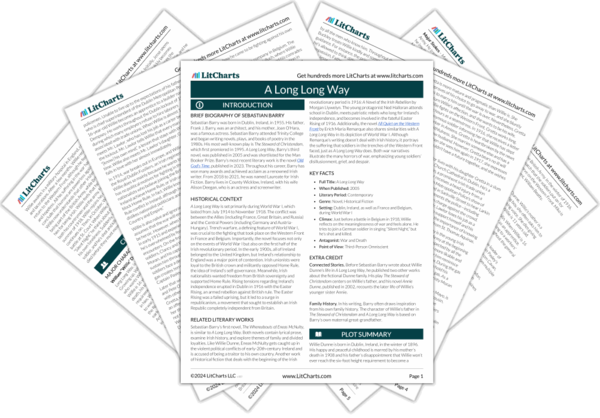A Long Long Way is a coming-of-age narrative about Willie Dunne, a young man from Dublin, Ireland, who joins the British Army at the age of 18 to fight in World War I. At the beginning of the novel, Willie is naïve and doesn’t yet “[know] his own mind.” In other words, Willie hasn’t formed his own opinions about the world and thus, the novel suggests, isn’t yet an adult. Instead, he unquestioningly adopts his father’s beliefs. He’s also ignorant about the reality of war and the rising conflicts in Ireland. As the plot progresses, however, Willie grows increasingly disillusioned. After his first experience of trench warfare in France, Willie quickly learns that there is no heroism or virtue in war—only terror and violence. He’s also exposed to differing perspectives on Ireland’s relationship to England. Realizing how little he understands about the larger political context that shapes his life, Willie feels more and more confused. He seeks certainty in other people’s opinions, although Father Buckley tells him he can and should think for himself. The novel frames this seeking as another symptom of Willie’s youth: he’s still trying to find someone else’s opinions to adopt, rather than forming his own.
Finally, the aftermath of the Easter Rising and the execution of Jesse Kirwan prompt Willie to come to his own conclusions about Ireland, the war, and his own place in the world. Willie finds he sympathizes with the nationalist rebels at home and despises the needless suffering that war causes. At last, Willie knows his own mind, even though his new convictions offend his father. By the end of the novel, 21-year-old Willie is still young, but his childish naivety is gone. In its place is a hard-won maturity and understanding of the world that Willie has attained through great suffering. Thus, A Long Long Way suggests that growing up means coming to know one’s own mind, a process which requires disillusionment and the loss of naivety.
Youth, Naivety, and Growing Up ThemeTracker

Youth, Naivety, and Growing Up Quotes in A Long Long Way
“You should have an opinion. I don’t care what a man thinks as long as he knows his own mind.”
They would smash the line in a thousand places, and the horses and their gallant riders would be brought up and they would go off ballyhooing across open ground, slashing at the ruined Germans with their sabres. And good enough for them. Their headgear would stream in the foreign sun and the good nations would be relieved and grateful!
When they came into their trench he felt small enough. The biggest thing there was the roaring of Death and the smallest thing was a man. Bombs not so far off distressed the earth of Belgium, disgorged great heaps of it, and did everything except kill him immediately, as he half expected them to do.
Soon the places were filled with new men from home. Flocks and flocks and flocks of them, thought Willie. King George’s lambs. It was just a little inkling of a thought.
“I’m not going to shoot you,” [Willie] said. “Are you a German?”
“German?” said the man. “German? What are you talking about? I’m an Irishman. We’re all Irishmen in here, fighting for Ireland.”
So Willie started to sing the “Ave Maria.” Well, it was the very selfsame song he had sung for the singing competition, when his father witnessed his undoing. But he had heard that twiddly bit between the verses now, and he knew he was ready for it.
We got the news now about the three leaders shot. Some of the men think it is a good thing. Myself, I cannot say what I think hardly. How I wish I were at home now and was able to talk these matters over with you. I wish they had not seen fit to shoot them. It doesn’t feel right somehow. I don’t know why. What does John Redmond say about it? When I came through Dublin I saw a young lad killed in a doorway, a rebel he was, and I felt pity for him. He was no older than myself. I wish they had not seen fit to shoot the three leaders.
Nevertheless, the distance between the site of war and the site of home was a long one and widening. Not the ordinary pragmatic miles between, but some other, more mysterious measure of distance.
“You can know your own mind and your father can know his.”
“But my father and me always had the one mind on things. That’s the trouble, I think—I don’t even know. I’m confused, Father.”
“It’s a funny, dark world out at the war, Papa,” said Willie slowly. “It brings your mind to think a thousand thoughts, a thousand new thoughts.”
“I won’t stand here and listen to your villainy!” shouted his father.
It had nothing to do with kings and countries, rebels or soldiers. Generals or their dark ambitions, their plus and their minus. It was that Death himself had made those things ridiculous. Death was the King of England, Scotland and Ireland. The King of France. Of India, Germany, Italy, Russia. Emperor of all the empires. He had taken Willie’s companions, lifted away entire nations, looked down on their struggles with contempt and glee. The whole world had come out to decide some muddled question, and Death in delight rubbed his bloody hands.











